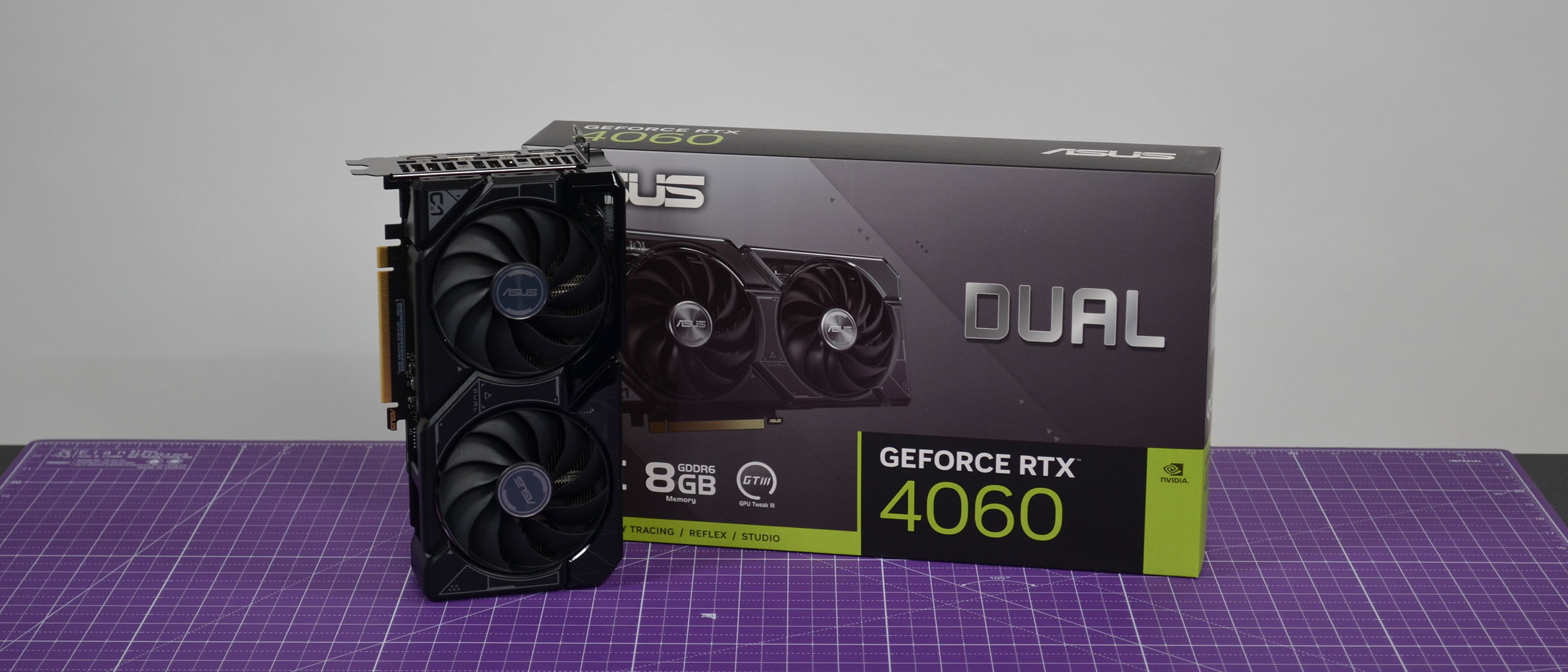TechRadar Verdict
The Nvidia GeForce RTX 4060 makes a fantastic upgrade for anyone looking for best-in-class 1080p performance while leaving the door open for some solid 1440p performance (with caveats) at an acceptable price point. The biggest problem though is with its 8GB VRAM, which puts a cap on how high up the resolution stack this card can effectively go even as its best features are tied too closely to whether game developers implement them.
Pros
- +
Best-in-class 1080p performance
- +
Under $300
- +
DLSS 3 with Frame Generation
- +
Moderate 1440p gaming is possible
Cons
- -
Best features depend on developers implementing DLSS 3
- -
Only 8GB VRAM
Why you can trust TechRadar
Editor's Note
• Original review date: June 2023
• Launch price: MSRP at $299 / £289 / AU$479
• Lowest price now: $445.60 / £279 / AU$543
Update – April 2025: With the recent release of Nvidia's 50 series graphics cards—and the mixed reviews they've received from both reviewers and customers alike—the Nvidia RTX 4060 would look like the best graphics card to buy for upgrading your 1080p GPU under normal circumstances, but unfortunately this card is becoming increasingly hard to find on store shelves.
Worse still, those places that do still have the card in stock are selling it for much more than the card's MSRP in the US, making it a much less attractive option when the Nvidia GeForce RTX 5060 will launch at the same MSRP in a few weeks (the UK and Australia have an easier time finding it at or near RRP). Even with the current US market's price inflation, the RTX 5060 will likely sell for the same amount as the inflated RTX 4060 prices I'm seeing online today.
If you can find this card for its MSRP or less and you only want something cheap for 1080p gaming, definitely consider it, as it's one of the best cheap graphics cards you're going to find. Otherwise, I'd recommend you wait and see what the RTX 5060 looks like, not to mention the AMD Radeon RX 9060 XT and RX 9060, which are also due out in the next month or two and should be priced similarly.
Original unedited review follows...

Nvidia GeForce RTX 4060: Two-minute review
Nvidia really wants you to know that the Nvidia GeForce RTX 4060 is a card for those who are still running a GTX 1060 or RTX 2060, and it's really Team Green's best marketing strategy for this card.
To be clear, the Nvidia RTX 4060 is respectably better than the Nvidia RTX 3060 it replaces, and comes in at a lower launch MSRP of $299 (about £240/AU$450) than its predecessor. Its 1080p gaming performance is the best you're going to find under $300, and its 1440p performance is pretty solid, especially when you turn on DLSS. If you're playing a game with DLSS 3 and frame generation, even better.
Sign up for breaking news, reviews, opinion, top tech deals, and more.
Unfortunately, the card's 4K performance suffers due to the limited video memory it's working with, which is a 50% decrease from the initial RTX 3060 run's 12GB VRAM pool (though at least it doesn't go below the 8GB of the later RTX 3060s).
You also get more sophisticated ray tracing and tensor cores than those found in the Ampere generation, and this maturity shows up in the card's much-improved ray tracing and DLSS performance.
There are also some added bonuses for streamers as well like AV1 support, but this is going to be a lower-midrange gamer's card, not a streamer's, and for what you're getting for the price, it's a great card.
The real problem for this card though is the Nvidia GeForce RTX 3060 Ti. For more than a year after the RTX 3060 Ti hit the scene, it topped our best graphics card list for its spectacular balance of price and performance, punching well above its weight and even outshining the Nvidia GeForce RTX 3070.
Ever since the crypto bubble popped and Nvidia Lovelace cards started hitting the shelves, the last-gen Nvidia Ampere cards have absolutely plummeted in price, including the RTX 3060 Ti. You can now get the RTX 3060 Ti for well below MSRP, and even though the RTX 4060 outperforms the RTX 3060 by roughly 20%, it still falls short of the RTX 3060 Ti, so if you are able to get an RTX 3060 Ti for near or at the same price as the RTX 4060, it might be a better bet. I haven't seen the RTX 3060 Ti drop that low yet, but it's definitely possible.
The reason why the RTX 3060 Ti is competitive here is especially because many of the best features of the RTX 4060 depend on other people implementing Nvidia's DLSS 3 technology in their products. DLSS 3 with Frame Generation is incredible for most games (though there are some latency issues to work out), but the number of games that implement it is rather small at the moment.
Many newer games will have it, but as we've seen with the recent controversy over Starfield partnering with AMD, one of the biggest PC games of the year might not have DLSS implemented at all at launch. It's a hard thing to hold against the RTX 4060 as a solid negative, since when the technology is implemented, it works incredibly well. But it's also unavoidable that Nvidia's biggest selling point of this generation of graphics cards is explicitly tied to the cooperation of third-party game developers.
With something like the Nvidia GeForce RTX 4070, DLSS 3 is a nice feature to have, but it doesn't make or break the card. With the RTX 4060, its appeal is deeply tied to whether or not you have this tech available in your games, and it seriously undercuts the card when it isn't. Its non-DLSS performance is only better than the RTX 3060 by a standard gen-on-gen uplift at 1080p, and without DLSS, 1440p gaming is possible, but will be severely hampered by the limited VRAM. 4K gaming, meanwhile, would be out of the question entirely.
All that said, the Nvidia RTX 4060 is still going to be one hell of an upgrade for anyone coming from a GTX 1060 or RTX 2060, which is really where this card is trying to find its market. RTX 3060 gamers will honestly be better off just saving up some more money for the RTX 4070 than worrying about the RTX 4060 (and you can probably skip the Nvidia RTX 4060 Ti, honestly).
If you're looking for the best cheap graphics card from Nvidia, the Nvidia GeForce RTX 4060 is probably as good as it's going to get for a while, since there have been few - if any - rumblings about an Nvidia RTX 4050 or Nvidia RTX 4050 Ti coming to the budget segment any time soon. Whether it's worth upgrading from an RTX 3060 is debatable, but if money is tight and looking for an upgrade from the Pascal- or Turing-era 60-series cards, you'll absolutely love this card.
Nvidia GeForce RTX 4060: Price & availability
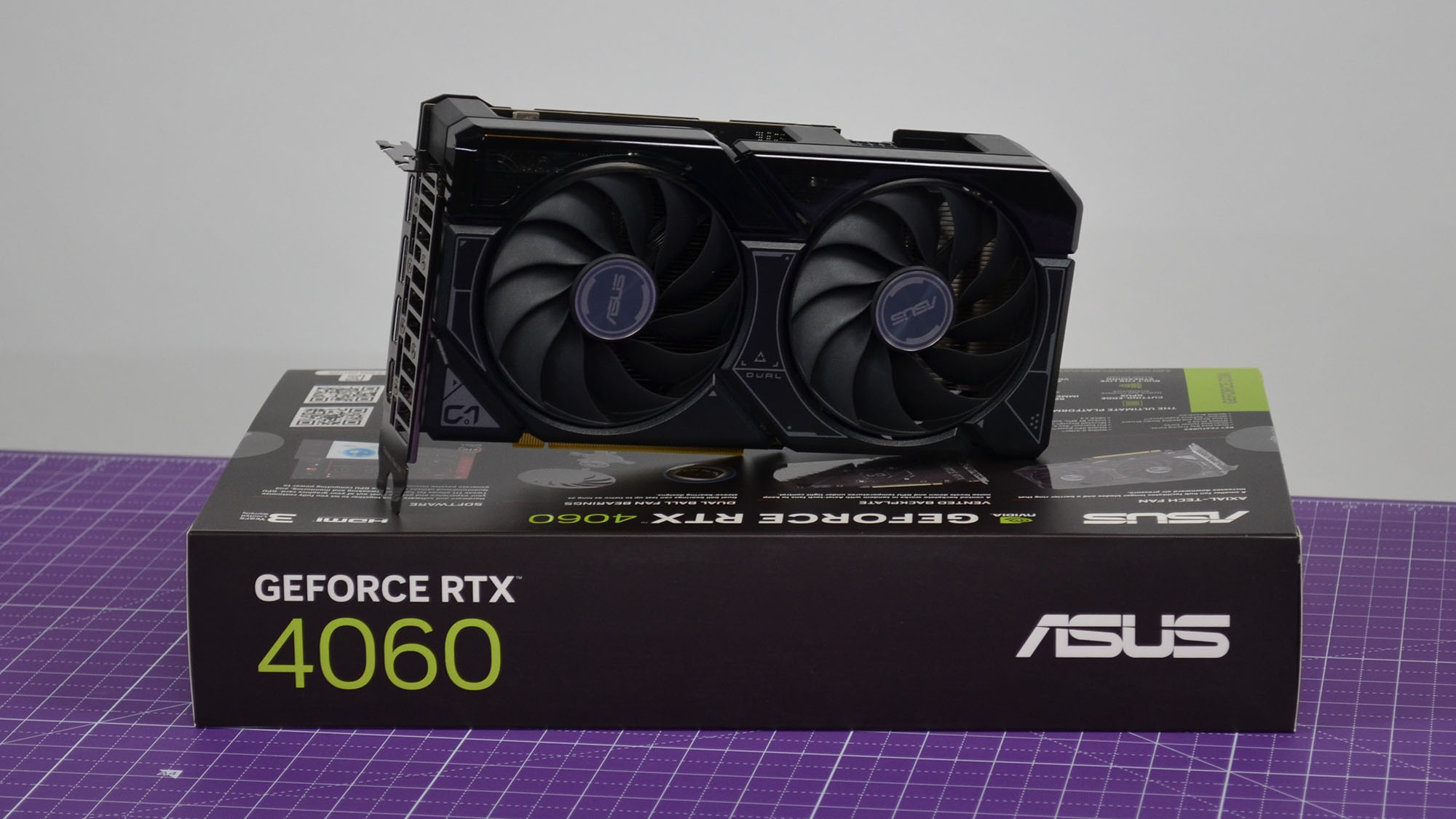
- How much is it? MSRP is $299 / £289 / AU$479
- When is it out? June 29, 2023
- Where can you get it? Available globally
The Nvidia GeForce RTX 4060 is available on June 29, 2023, for an MSRP of $299 / £289 / AU$479, which is about 10% less than the RTX 3060 was when it launched in 2021.
There is a caveat to this pricing in that there is no Nvidia Founders Edition of the RTX 4060, so it is only available from third-party partners like Asus, PNY, and others. These manufacturers can charge whatever they want for the card, so you can expect to see many of the cards priced higher than Nvidia's MSRP, but there will be those like the Asus RTX 4060 Dual that I tested for this review that will sell at MSRP.
While this card is cheaper than most, it's not the cheapest of the current generation. That would be the AMD Radeon RX 7600, which has an MSRP of $269.99 (about £215/AU$405), which still offers the best performance-to-price value of any of the current-gen cards. Still, given the actual level of performance you get from the RTX 4060, it definitely offers a compelling value over its rival cards, even if they are cheaper in the end.
Nvidia GeForce RTX 4060: Features and chipset
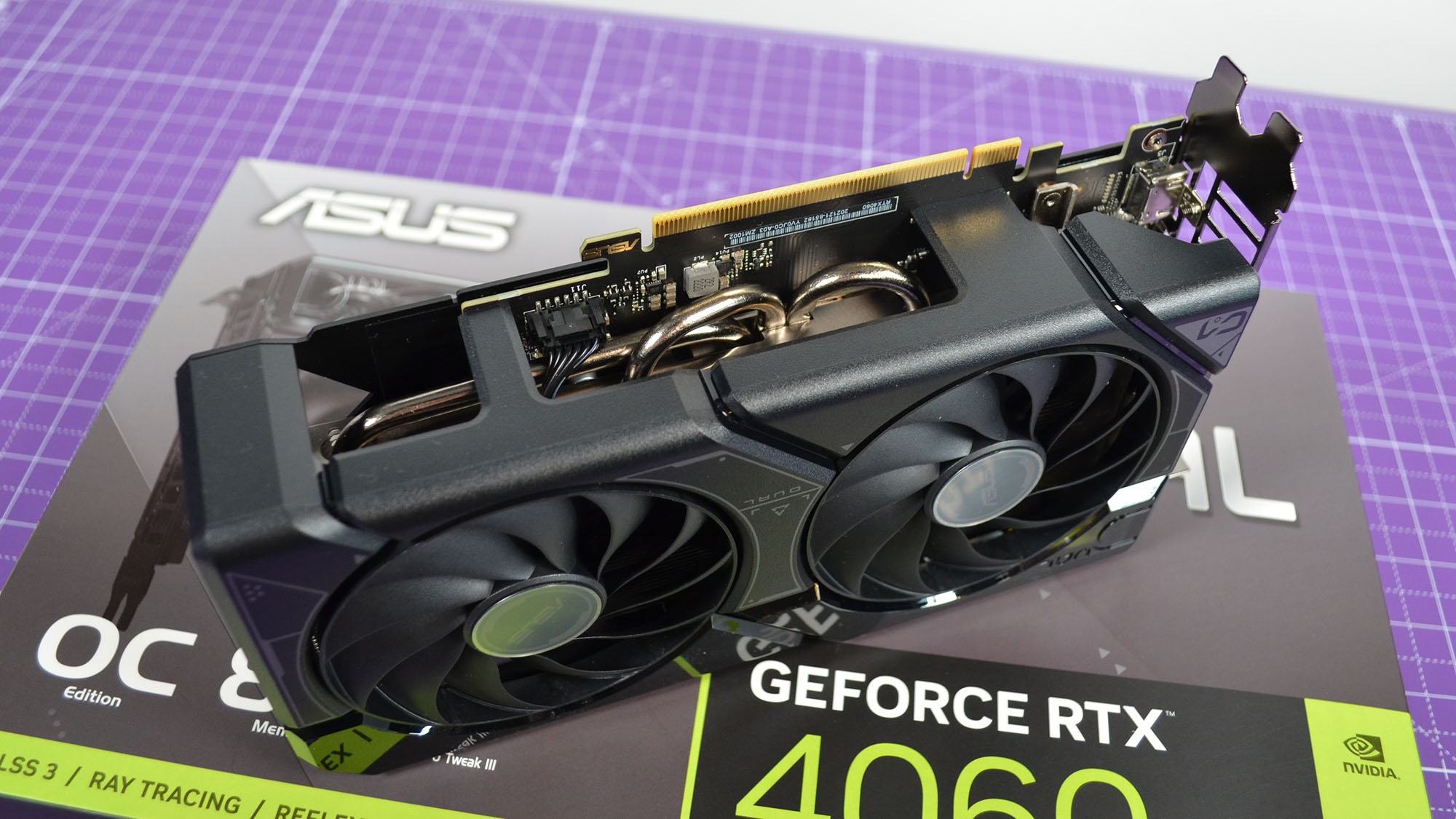
- 3rd-gen ray tracing and 4th-gen tensor cores
- Only 8GB VRAM
- DLSS 3 with Frame Generation under $300
| Header Cell - Column 0 | Nvidia GeForce RTX 4060 Reference Specs | Asus Dual GeForce RTX 4060 OC Edition Specs |
|---|---|---|
Process Node | TSMC 5nm | TSMC 5nm |
Transistor Count | 18.9 billion | 18.9 billion |
Boost Clock | 2,460MHz | 2,505MHz (default) / 2,535MHz (performance mode) |
VRAM | 8GB GDDR6 | 8GB GDDR6 |
Memory Bus | 128-bit | 128-bit |
L2 Cache | 24MB | 24MB |
Memory Speed | 17 Gbps | 17 Gbps |
Memory Bandwidth | 272 GB/s | 272 GB/s |
CUDA Cores | 3,072 | 3,072 |
Ray Tracing Cores | 24 | 24 |
Tensor Cores | 96 | 96 |
TGP | 115 | 115 |
Connector | 8-pin | 8-pin |
Outputs | 3 x DisplayPort 1.4a, 1 x HDMI 2.1a | 3 x DisplayPort 1.4a, 1 x HDMI 2.1a |
In terms of specs, the Nvidia GeForce RTX 4060 is a marked improvement over the Nvidia RTX 3060 thanks to a smaller TSMC 5nm process node compared to the RTX 3060's 8nm Samsung node. It also features much faster clock speeds, with a roughly 39% faster base and boost clock speed.
You also have a faster memory speed, but a smaller VRAM pool and smaller memory bus, so you end up with a roughly 25% smaller memory bandwidth, which really puts a ceiling on higher resolution performance.
Still, with faster clock speeds, more mature ray tracing and tensor cores, and a lower TGP than its predecessor, this is one of the most powerful and energy-efficient graphics cards in its class.
Nvidia GeForce RTX 4060: design
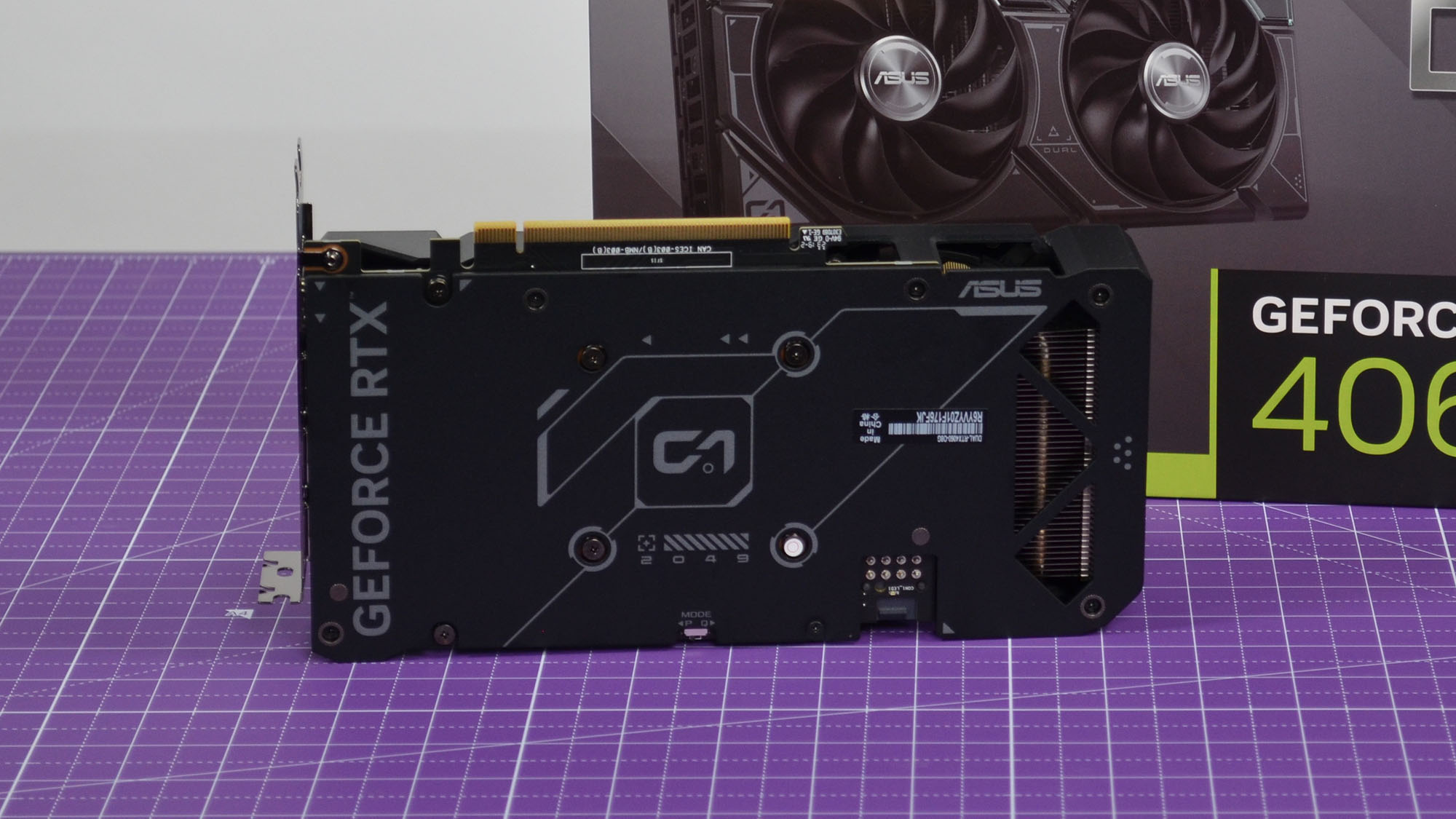
There is no reference design for the Nvidia RTX 4060, since there is no Founders Edition, so the design of the card is going to depend entirely on which version you get from which manufacturer.
In my case, I received the Asus GeForce RTX 4060 Dual OC edition, which features a dual fan design and a much smaller footprint befitting a midrange card. Thankfully, the card uses an 8-pin power connector, so there's no need to fuss with any 12VHPWR adapter cables.
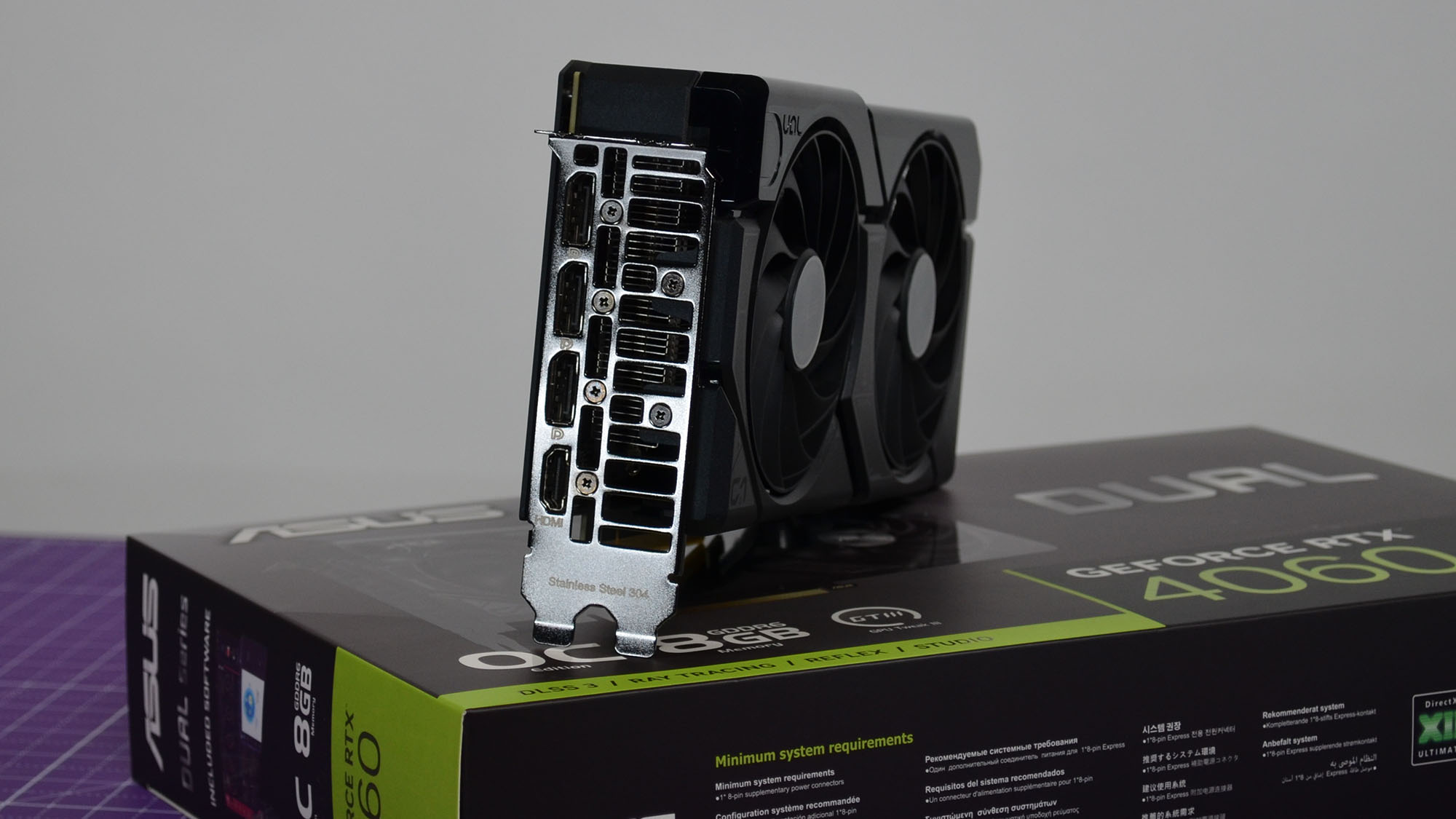
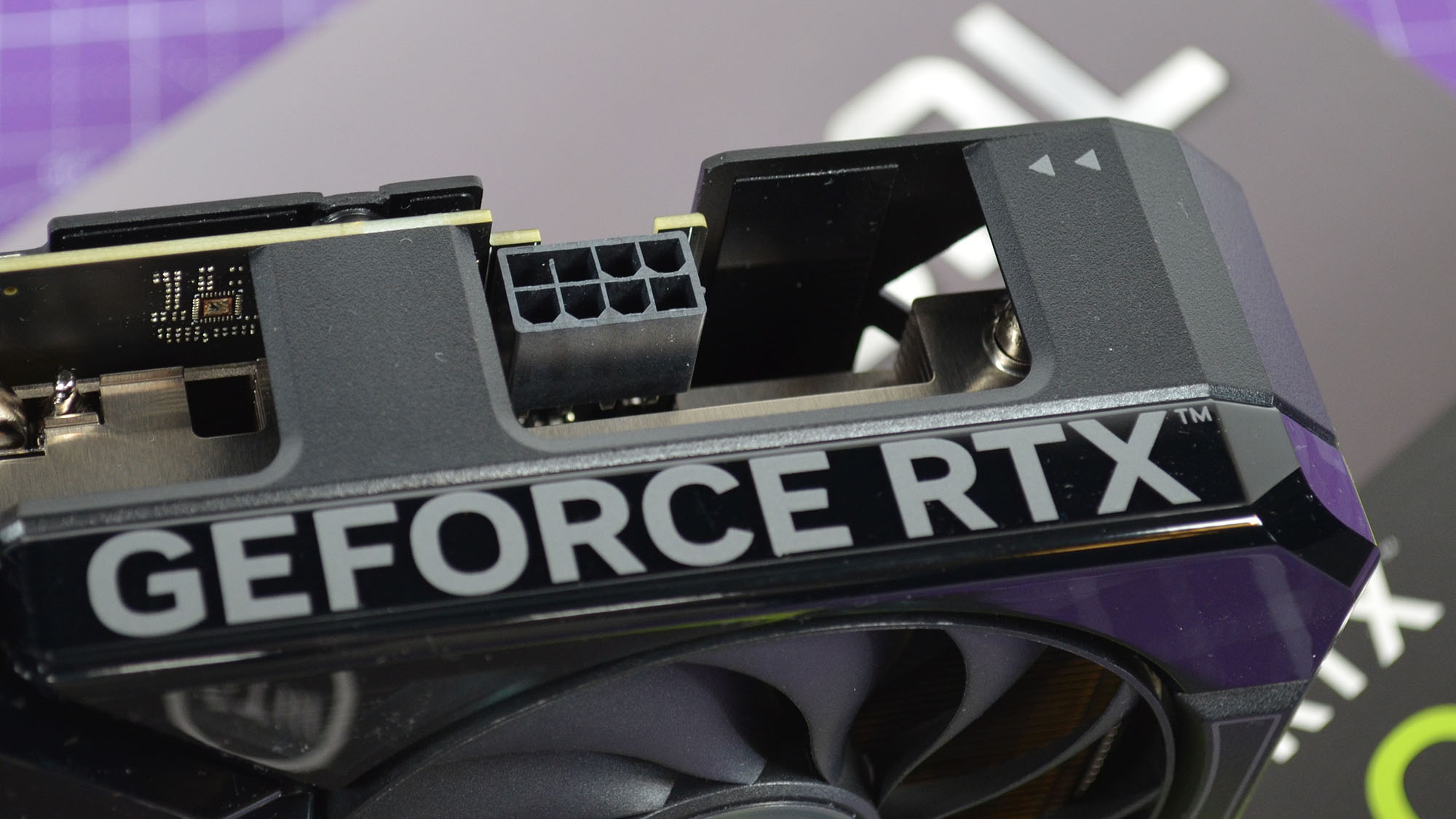
It comes with the now-standard three DisplayPort 1.4 and one HDMI 2.1 video outputs on this generation of Nvidia cards, so those with one of the best USB-C monitors will once again be out of luck here.
The card is a dual-slot width, so you shouldn't have any issues getting it into a case, and it's light enough that you really should be able to get away without having to use a support bracket.
Nvidia GeForce RTX 4060: Performance
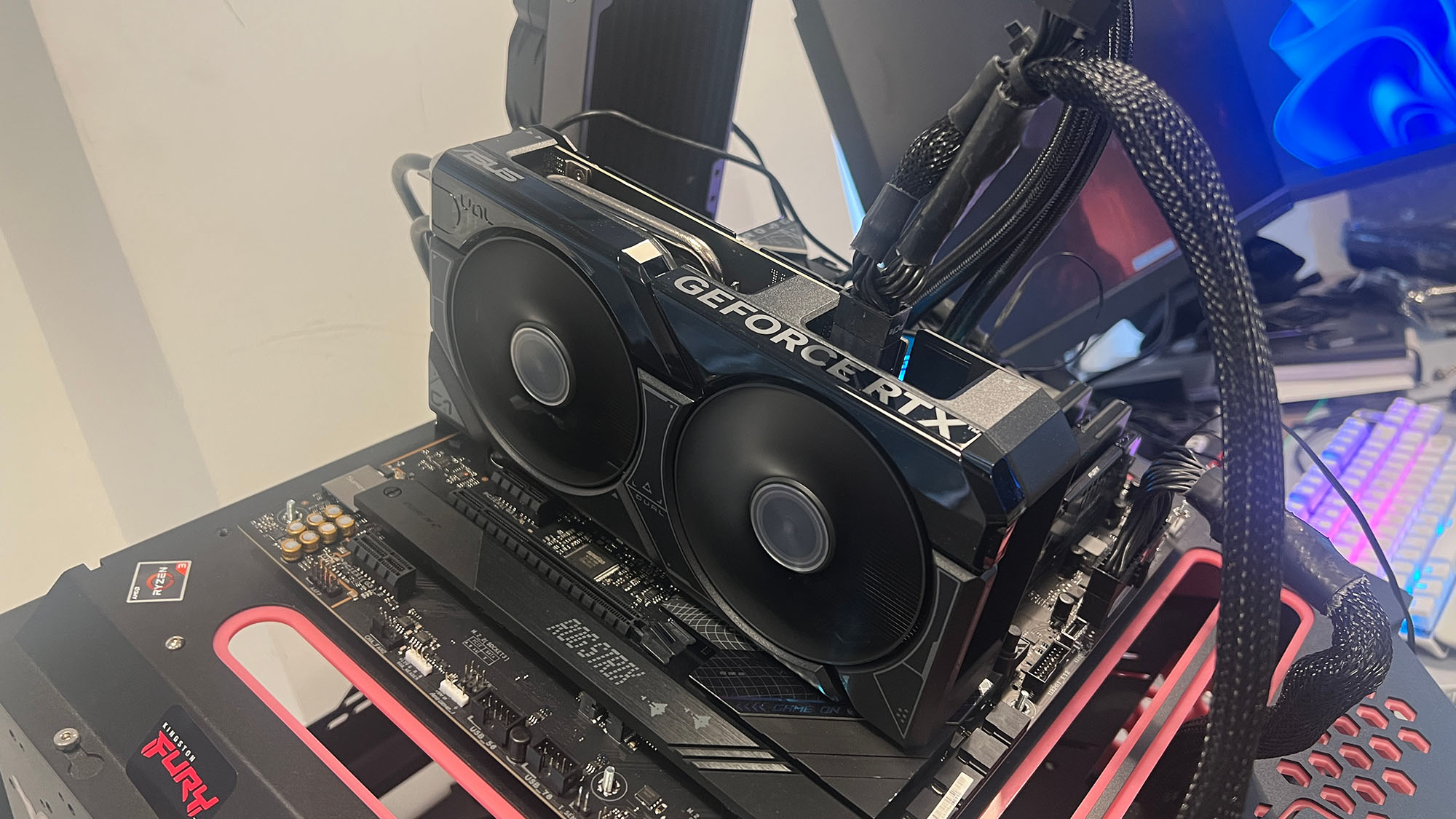
- Best-in-class 1080p gaming performance
- Huge improvement if coming from RTX 2060 or older
This is the system we used to test the Nvidia GeForce RTX 4060:
CPU: Intel Core i9-13900K
CPU Cooler: Cougar Poseidon GT 360 AIO
RAM: 64GB Corsair Dominator Platinum RGB DDR5-6600MHz
Motherboard: MSI MAG Z790 Tomahawk Wifi
SSD: Samsung 990 Pro 2TB NVMe M.2 SSD
Power Supply: Corsair AX1000
Case: Praxis Wetbench
When it comes to 1080p, the Nvidia RTX 4060 offers the best gaming performance under $300.
The AMD RX 7600 gives it a run for its money in pure rasterization performance, and even manages to beat out the RTX 4060 on occasion, but once you start cranking up ray tracing the RTX 4060 absolutely pulls away from its rivals.
This is especially true when you flip the switch on DLSS, which makes 1440p gaming a very feasible option with this card. While this definitely isn't going to be one of the best 1440p graphics cards, on certain titles with certain settings, you'll be surprised what you can get away with.
Synthetic Benchmarks
| Header Cell - Column 0 | Nvidia RTX 4060 | AMD RX 7600 | Nvidia RTX 3060 |
|---|---|---|---|
Firestrike | 28,120 | 31,837 | 22,732 |
Nightraid | 130,102 | 125,313 | 108,208 |
Speedway | 2,534 | 1,963 | 2,182 |
Port Royal | 6,033 | 5,509 | 5,156 |
Time Spy | 10,563 | 10,819 | 8,777 |
Firestrike Extreme | 13,142 | 14,780 | 10,609 |
Time Spy Extreme | 4,949 | 5,147 | 4,100 |
Firestrike Ultra | 5,709 | 7,251 | 5,094 |
Wildlife Extreme | 20,474 | 18,928 | 17,410 |
Wildlife Extreme Unlimited | 20,340 | 19,119 | 17,330 |
PassMark 3D | 23,956 | 22,008 | 20,786 |
Average 1080p Performance | 79,111 | 78,575 | 65,470 |
Average 1440p Performance | 8,068 | 8,268 | 6,681 |
Average 4K performance | 12,868 | 12,611 | 10,983 |
Average Performance | 24,174 | 23,879 | 20,216 |
When it comes to synthetic benchmarks, you get the typical blow-for-blow between Nvidia and AMD cards that we've seen in the past, with AMD outperforming on pure rasterization tests like 3DMark Time Spy and Firestrike, while Nvidia pulls ahead on ray tracing workloads like Port Royal and Speedway.
The RTX 4060 and RX 7600 are close enough in terms of raw performance that it might as well be a wash on average, but it's worth noting that the RTX 4060 is about 20% better on average than the RTX 3060. I point that out mostly to contrast it with the RTX 4060 Ti, which was only about 10-12% better than the RTX 3060 Ti on average.
A 20% improvement gen-on-gen, on the other hand, is much more respectable and justifies considering the RTX 4060 as an upgrade even with an RTX 3060 in your rig. You might not actually make that jump for an extra 20% performance with this class of GPU, but it's at least worth considering, unlike with the RTX 4060 Ti.
Gaming Benchmarks
| Header Cell - Column 0 | Nvidia RTX 4060 | AMD RX 7600 | Nvidia RTX 3060 |
|---|---|---|---|
Metro: Exodus | 45 | 43 | 37 |
F1 2022 | 190 | 168 | 147 |
Total War: Warhammer III | 84 | 82 | 72 |
Cyberpunk 2077 | 79 | 87 | 70 |
Returnal | 85 | 81 | 70 |
Where the RTX 4060 really takes off though is in gaming performance. Compared to the RX 7600, it's more or less even when just playing at 1080p with max settings without ray tracing or upscaling. Notably, the RTX 4060 actually underperforms the RX 7600 by about 9% in Cyberpunk 2077 when you're not using ray tracing or upscaling.
| Header Cell - Column 0 | Nvidia RTX 4060 | AMD RX 7600 | Nvidia RTX 3060 |
|---|---|---|---|
Metro: Exodus | 33 | 27 | 27 |
F1 2022 | 76 | 71 | 65 |
Cyberpunk 2077 | 32 | 8 | 30 |
Returnal | 68 | 53 | 55 |
Crank ray tracing up to Psycho in Cyberpunk 2077 though, and the value of the RTX 4060 really starts to show through. The RX 7600 absolutely tanks when RT is maxed, but that's not universal across the board. In other games, the RX 7600 is competitive, but Cyberpunk 2077 really is AMD's Achilles' Heel. Meanwhile, the RTX 3060 holds up fairly well on some titles, while the RTX 4060 pulls ahead by a substantial amount on others.
| Header Cell - Column 0 | Nvidia RTX 4060 | Nvidia RTX 4060 (DLSS 3 with Frame Generation) | AMD Radeon RX 7600 | Nvidia RTX 3060 |
|---|---|---|---|---|
Cyberpunk 2077 (Quality) | 59 | 92 | 19 | 48 |
Cyberpunk 2077 (Ultra Performance) | 113 | 161 | 49 | 90 |
Returnal (Quality) | 64 | 83 | 76 | 73 |
Returnal (Ultra Performance) | 83 | 126 | 98 | 95 |
With upscaling turned on, the RTX 4060 manages to substantially outperform both the RTX 3060 and the RX 7600. If you leave the base DLSS settings and don't mess with frame generation, the RTX 4060 pulls off a clean win on Cyberpunk 2077, while it has a slightly lower average framerate than the RTX 3060, but a higher minimum framerate, it's a much more stable experience across the board.
Once you turn on frame generation though, things swing dramatically in the RTX 4060's favor. You can even increase the resolution in Cyberpunk 2077 to 1440p with Frame Generation on and you'll get more fps on average and at a minimum than you would with the RTX 3060 at 1080p, while the RX 7600 simply can't keep up at this level.
Unfortunately, a lot of this is dependent on developers implementing Nvidia's new technology. Without DLSS 3 with Frame Generation, you still get respectably better performance than the RTX 3060, but nothing that absolutely blows you away.
Meanwhile, the RX 7600 offers a compelling alternative if you're looking to save some money and don't care about 1440p or ray tracing.
Still, if you can toggle a setting and give yourself an extra 50 fps on a demanding game, there really is no comparison, and on this alone, the RTX 4060 wins out by default.
Should you buy the Nvidia GeForce RTX 4060?
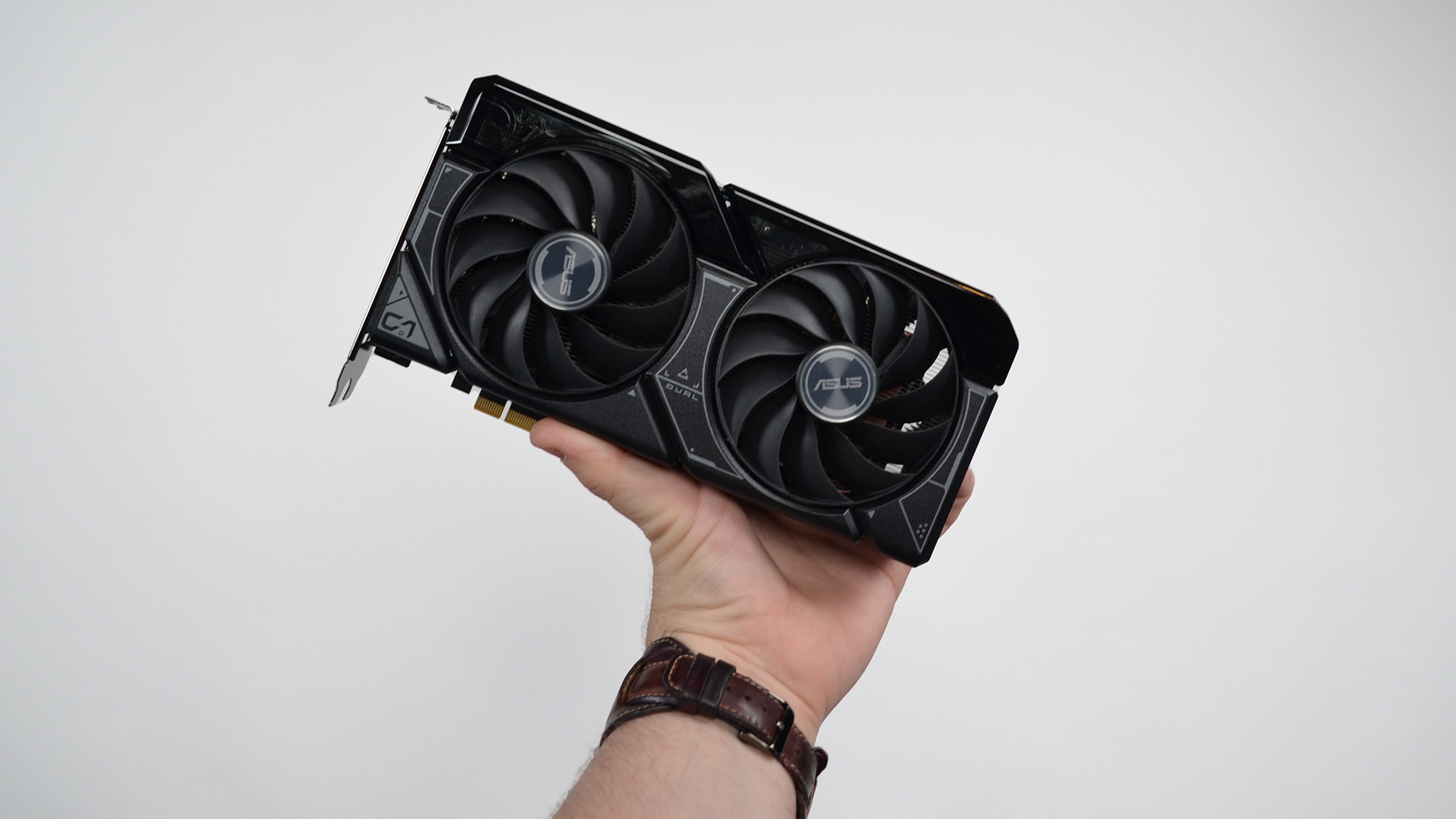
Value | For a sub-$300 graphics card, the RTX 4060 offers an incredible value. | 4.5 / 5 |
Features & chipset | The 8GB VRAM on this card is disappointing, but DLSS 3 at this price and the dramatically lower TGP saves it in a huge way. | 4.5 / 5 |
Design | The RTX 4060 gets docked a half point for not having a reference card, but the low TGP means no one needs to use Nvidia's stupid 12VHPWR cable. | 4.5 / 5 |
Performance | In terms of 1080p gaming performance, this card is the best it gets at this price point. | 5 / 5 |
Total | The RTX 4060 goes toe-to-toe with the AMD RX 7600, but at a higher price point, the selling point on this card is its best-in-class 1080p performance. If you want the best 1080p card, this is it. | 4.625 / 5 |
Buy it if...
You want the best 1080p gaming under $300
This card is a 1080p champ in its weight class, even if it walks right up to the line of the middle midrange.
You want fantastic ray tracing support
Nvidia pioneered real-time ray tracing in games, and it really shows here.
Don't buy it if...
You want the best value
While the RTX 4060 is very well-priced, the AMD RX 7600 offers a much better price-to-performance ratio.
You don't care about ray tracing or upscaling
Ray tracing is honestly overrated and a lot of games don't offer or even need upscaling, so if you don't care about these features, Nvidia's RTX 4060 might not offer enough for you to spend the extra money.
Nvidia GeForce RTX 4060: Also consider
AMD Radeon RX 7600
Team Red's competing midrange card is a fantastic value while offering compelling 1080p performance (so long as ray tracing and upscaling aren't your biggest concerns).
Read the full AMD Radeon RX 7600 review
Nvidia GeForce RTX 3060 Ti
With graphics card prices for the Nvidia RTX 3000-series continuing to come down, its possible that this card might come in close to the RTX 4060's MSRP, and with its better performance, it offers a compeling alternative.
Read the full Nvidia GeForce RTX 3060 Ti review
How I tested the Nvidia GeForce RTX 4060
- I spent about a week testing the card
- I looked at the cards gaming performance and raw synthetic performance
- I used our standard battery of graphics card tests and several current PC games to push the GPU to its limits.
I spent extensive time testing the RTX 4060 over a number of days, using synthetic tests like 3DMark and Passmark, while also running several games on the card at different settings and resolutions.
I also tested its closest rival card as well as the card it is replacing in Nvidia's product stack and compared the performance scores across the cards to assess the card's overall performance.
I did this using the latest Nvidia and AMD drivers on a test bench using all of the same hardware for each card tested so that I could isolate the graphics card's contribution to the overall performance I found in-game or in synthetic benchmarks.
We pride ourselves on our independence and our rigorous review-testing process, offering up long-term attention to the products we review and making sure our reviews are updated and maintained - regardless of when a device was released, if you can still buy it, it's on our radar.
First reviewed June 2023

John (He/Him) is the Components Editor here at TechRadar and he is also a programmer, gamer, activist, and Brooklyn College alum currently living in Brooklyn, NY.
Named by the CTA as a CES 2020 Media Trailblazer for his science and technology reporting, John specializes in all areas of computer science, including industry news, hardware reviews, PC gaming, as well as general science writing and the social impact of the tech industry.
You can find him online on Bluesky @johnloeffler.bsky.social
You must confirm your public display name before commenting
Please logout and then login again, you will then be prompted to enter your display name.
